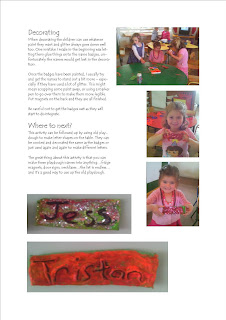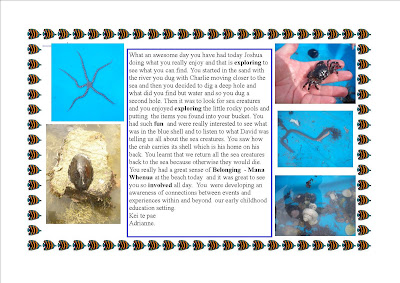
Hunter Park Kindergarten
Wednesday, November 30, 2011
Visitors

Tuesday, November 29, 2011
Ukulele
We've hired a class set of ukulele for three weeks. Ngaire Shand (who used to teach Nadine) came and gave us our initial instruction and since then we've practised our c and f chords every day with even a sneak peek at G7.
We've been learning some names for our fingers, Thumb, pointer, tallman, ringman and pinkie, names for parts of the ukulele, head, neck, body, frets, strings, tuning keys, and how to play the c and the f chord. I noticed we were getting pretty quick at swapping so sometimes we even have a go at song were we have to swap from one chord to the other.
We've been learning to play fast and slow, loud and soft as well.
Since Ngaire made us up a song we've also been making up our own songs and have noticed the children have been creating their own songs as well. In addition to as our more formal session for everybody we also have less formal opportunities to play for those who are interested, with a few extra instruments and the option to dance as well.
Monday, November 28, 2011
Monday, November 7, 2011
Education Debate, have a listen.
Here is a link to the education debate that took place on radio on the 7th of November.
Worth listening to, I know I found out about policies being implemented I hadn't heard about. The ECE debate takes place from the 27th minute but since the children now in kindergarten will be at school in three years you should listen to it in full.
The highlight for me was the 3 R's Relationships, Resourcing, Relevance, something I readily agree with. There were also hints about compulsory early childhood, further funding cuts, hints about closure and consolidation of small and rural schools, privatisation of education, parent fees, class sizes (is the funding sufficient), teacher aides, ratios of qualified teachers to children (is funding only 80% trained a backdoor teacher child ratio cut), and food in schools.
Inform yourself, weigh the arguments and reasoning, and be sure to get out and vote for your choice.
Be aware there is a lot of spin with carefully phrased messages that may give an understanding to the listener different to what has actually been said. There is also quite a bit of and questioning as to who is telling the truth.
As a guide in the case of funding you might want to consider more funding total does not necessarily mean more per child. An increase in total child numbers for the country, percentage participation by the population,total hours of participation, inflation, g.s.t., planned increases for more qualified teachers, etc will all affect the actual funding.
To sort this all out you should seek out your own information to check the validity of the various statements. As a start below are some quotes and links to a few articles discussing changes to early childhood education over the past three years with some quotes from Anne Tolley and Sue Moroney that I've noted from 2011, 2010 and 2009.
I'd also recommend this link to 15 press releases put out over the last two years by the kindergarten's national body, but do look up your own links and check the party websites as well.
sample NZK release-STANDARDS UNDERMINED
“As at 1 July, groups of up to 150 children over two years old (75 under two years old) can occupy the same space at the same time – for example in the playground or while having a meal.” says Clare Wells, Chief Executive New Zealand Kindergartens (NZK)...“Being part of such a large group is not in the best interests of children and detrimental to their health, safety and wellbeing.” said Clare Wells.
Sample NZK release - 25 November, 2010 More funding cuts to kindergartens
Another million dollars will be cut from Government funding to kindergartens next year, on top of the estimated $14 million reduction in funding already announced in the budget, according to the New Zealand Kindergartens (NZK).
...
Services employing newly qualified teachers (provisionally registered teachers - PRTS) receive a grant to help those teachers to become fully registered. Each year, a grant of $4,300 per PRT is paid, supporting their two year induction programme. The programme is an essential part of the process of becoming a teacher. The research shows effective induction is critical to the success of newly qualified teachers in both ECE services and schools.
2011http://www.scoop.co.nz/stories/PA1105/S00295/embarrassing-boo-boo-by-tolley-on-ece-cuts.htm
During a speech at the NZ Kindergarten’s Association Conference today, the Minister trumpeted the Napier Kindergarten Association as an example of being able to “do more with less”.
“But just moments later, she was corrected by the general manager of the Napier Association, Helen McNaughton, who was in the audience.
“Helen McNaughton said that in fact kindergartens are considering fee increases to families so they can balance the budget. She pointed out the figures the Minister had quoted were from the 2010 year – before the funding cuts were implemented.
...
“Anne Tolley also claimed that participation had increased at the Napier Kindergarten Association, but again, Helen McNaughton corrected her. She told the conference that the number of children accessing education through her association had actually dropped.
2010 http://www.stuff.co.nz/national/4072387
Kindergarten teachers say "brutal funding cuts" are threatening to squash their historic service to 26,000 Kiwi families.
On Friday, Education Minister Anne Tolley was challenged at the Kindergarten Association's annual conference over funding changes, which one service said would leave it with half of the money it had before.
Tolley was unapologetic over the cuts. She pressed kindergartens not to hike fees to make up the shortfall, but instead use fewer qualified teachers.
"You have your decisions to make around your budgeting. As minister, I have my decisions to make around my budgeting," Tolley said. "The rising costs were unsustainable."
The Government announced in the May Budget that the top rate of funding for early childhood education (ECE) centres with more than 80 percent qualified staff would be removed.
Kindergartens have 100 percent qualified staff. They estimate they will lose about $14 million as a result of the change.
Tolley said she did not accept kindergartens were at risk.
"You have a philosophical point of view and I respect that. But I can't afford to pay for it."
Kindergarten Association chief executive Claire Wells said research showed high levels of qualified teachers made for better ECE services.
2009 http://www.scoop.co.nz/stories/PA0907/S00036.htm
...The Ministry of Education has estimated that 19,000 additional places will need to be found for preschoolers by 2011 just to keep participation rates at current levels and to improve the participation of Maori and Pacific children.
...“Since becoming Minister of Education, Anne Tolley has scrapped a plan to improve child – teacher ratios, cut funding for teacher professional development and reduced standards for ECE centres,” Sue Moroney said....
Friday, October 28, 2011
Something to think on.
With the election approaching it's well worth doing some research so you can make informed decisions when choosing between policies.
Retirement age for instance, should it stay at 65 or go up to 67, how much should we pay for it? Here for example a bit of research may turn up that poorer members of communities could typically live around ten years less than wealthier members. So if poorer contributors on average only get 2 years of super, when wealthier friends get 10 years, who should pay the most?
Many policies are spun on short term benefit but have long term consequences. Such polices will impact on the adult lives of children now in kindergarten. What are the impacts and consequences positive and negative of the recent cuts to kindergarten funding? Here's a video for TED, filmed in Jul 2011, to start you thinking, New Zealand features in a lot of it's statistics and it is an eyeopener and worth waltching.
When filling your child's lunch box it's the ingredients not the packaging or brand association that's important, and we need to read them and know what's healthy to make healthy choices for our children.
Politicians all understand marketing and branding. As voters we make more informed decisions when we read and understand the label on the back to inform our choices.
It's not just the next three years, its their ongoing consequences in the years that come after.
Monday, October 3, 2011
Wednesday, September 28, 2011
Tuesday, September 27, 2011
Thursday, September 22, 2011
Friday, September 16, 2011
Monday, September 12, 2011
Friday, September 9, 2011
Tuesday, August 16, 2011
The day it snowed.
 It doesn't normally snow at the kindergarten though it has come close a few times, as one passing lady with grey hair commented, it hasn't snowed here since my children where young.
It doesn't normally snow at the kindergarten though it has come close a few times, as one passing lady with grey hair commented, it hasn't snowed here since my children where young.
Unfortunately our snow had been rained on over night so it was mostly ice, but up the road a bit on Pukeora hill it was several inches deep as it was at many children's homes.
At Kindy we tried to make some snow men, and snow balls but mostly watched it melt and I suspect ate some.
Monday, July 11, 2011
Thursday, June 23, 2011
Sunday, June 5, 2011
Thursday, June 2, 2011
Friday, May 27, 2011
Thursday, May 26, 2011
Tuesday, May 24, 2011
Special visitors
Nature has shared many special visitors and some beautiful days with us.
E whitu nga kahuku, tui, pungawerewere, me nga pukurau?/ paru-whatitiri?
Wednesday, May 11, 2011
Monday, May 9, 2011
Wednesday, April 20, 2011
Wednesday, April 6, 2011
Felting
Using the wool they dyed Jo and the children have been keen to experiment with felting. After watching some how too guides on YouTube they had a go. While they patted the felt for ten minutes they also learnt about music, body parts, time, rhythm and counting.
Wednesday, March 23, 2011
Acorn target
With three days of wet weather we've been getting out when we can. Rather than getting out lots of gear only to have to put it back again with the next shower, we've been making use of the bounty of nature. In this case falling acorns and leaves. We started aiming at the post then, moved back, then shifted to a leave stuck in the post as with practice our aim improved. We had to learn not to get to close as sometimes acorns miss or bounce back and hit us. Several children are now hitting the leaf from several meters back.
































































